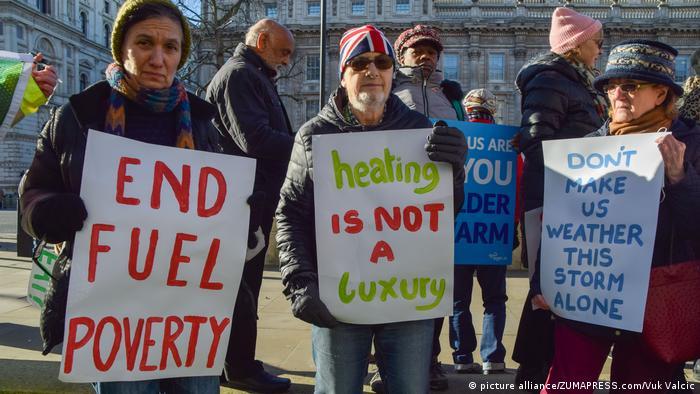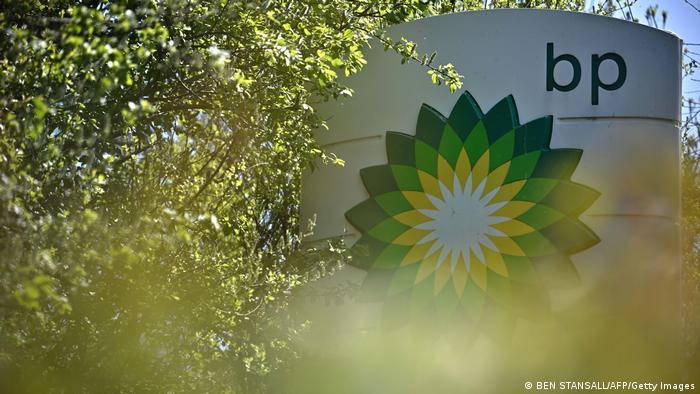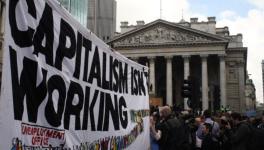UK Energy Bill Strike Campaign Gains Support

Protests against soaring energy prices were in evidence in the UK long before the most recent surge
Don't Pay UK says it will only go ahead with a payment strike if it reaches 1 million pledges by October 1, the date energy regulators Ofgem are set to raise the UK's energy price cap. With almost 100,000 people signed up so far and the numbers doubling each week, this is well within their sights.
"We support it, even if we ourselves won't have to make massive sacrifices," says Kate from Hastings in southern England. "But we know people who will be hit hard by rising energy bills and this is about showing solidarity," she told DW.
Launched after a Trade Union Congress demonstration in June, its founders say the group is an unfunded "grassroots movement” and is demanding energy suppliers reduce bills to what it calls an "affordable” level.
The energy price cap — a limit on the rate energy suppliers can charge for tariffs — was hiked a hefty 54% in February. The new cap level for average use customers is £1,971 (€2,328, $2,403), and Ofgem is expected to raise the cap to above £3,000 for the first time on October 1. It is expected to stay there until 2024 at the earliest.
Consulting firm Cornwall Insight forecast this week that the average bill would exceed £3,500 a year in the fall and estimates that it could reach £4,266 a year by early next year.
Fuel poverty beckons
More than half of households in the UK, about 15 million people, will have been pushed into fuel poverty — defined as having to spend over 10% of net income on fuel — by January 2023, according to a report by York academics. The report predicts that even with a £400 fuel rebate offered by the government, over 80% of large families, lone parents and pensioner couples will fall into fuel poverty.
"A new package of mitigations is urgently needed," Professor Jonathan Bradshaw from the Social Policy research unit at the University of York said this week. "This should be the main preoccupation of the Conservative leadership candidates,” he added.

Multinational oil and gas company BP is one of the big winners of rising energy prices
The government's energy bills support scheme provides a £400 discount on bills over six months from October for every household, a £650 means-tested one-off payment to low-income households, £150 for those on disability benefits and £300 for pensioners. But, critics say, this was designed when the forecast for the October price cap was £2,800.
Energy consultant BFY notes that fuel poverty will drive up serious ill health and early deaths. Each year an average of 9,700 deaths are believed to be caused by living in a cold house, according to research by the NEA charity.
Look before you leap
Citizens Advice and debt charity Stepchange have warned people not to support Don't Pay UK's campaign.
According to Citizens Advice, energy companies' first step will be to transfer those who don't pay onto a prepayment meter, the most expensive way to pay for energy.
Customers' debt could then be passed on to a debt collection agency, which would impact credit ratings and incur extra costs, such as legal fees for the energy firm.
"I have enormous sympathy with the sentiment of campaigning to highlight the soaring cost of energy and the plight of those who will not be able to afford to pay," Gary Rycroft, a Lancaster-based solicitor, told DW.
"My concern is individuals are being asked to do something — cancel their direct debit or otherwise not pay for their energy — which could put them at risk of being put on a higher tariff, or worse cut off and also have a judgment debt in the form of a court order against them, which will impact on their future ability to borrow money and/or rent or buy a house," Rycroft said.
He added it would be his advice to contact the energy company to say you are going to struggle to pay and ask them to agree to a revised payment plan. "They have a duty to do this and if you reach a deadlock with them you can go to the ombudsman to seek a resolution,” Rycroft insisted.
Profits over people?
BP earned €8.2 billion ($8.45 billion) between April and June, triple what it made in the same period of 2021, while Shell earned £9.4 billion in the same quarter. Centrica, the owners of British Gas, saw a profit of £1.3 billion in the first six months of 2022, five times the sum it made in the first half of 2021.
About 1 million non-payments would cost energy companies an average of £233 million per month in income, the campaigners say.
But energy suppliers say the price increases are not their fault.
"This is not in the hands of energy retailers," Dale Vince, founder of the energy firm Ecotricity, told Sky News. "The problem is the crazy price of gas on global commodity markets."
Edited by: Hardy Graupner
Get the latest reports & analysis with people's perspective on Protests, movements & deep analytical videos, discussions of the current affairs in your Telegram app. Subscribe to NewsClick's Telegram channel & get Real-Time updates on stories, as they get published on our website.
























